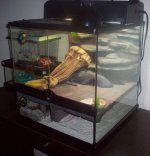Assessing Reptile Welfare Using Behavioural Criteria
Journal of the British Veterinary Association...March 2013
Spatial considerations
"Many reptiles are mistakenly and inhumanely kept in small cages due to erroneous advice handed down from one pet trader, hobbyist or ill-informed keeper to another. Common false understandings are that many reptiles ‘feel safer’ in small environments and that they are naturally ‘sedentary and don’t need space'. This rationale may suit the convenience of those seeking to promote reptiles as a ‘cage pet’, but it is scientifically and ethically wrong.
While reptiles, like other animals, require shelter to which they can voluntarily withdraw, the key elements are that the animal seeks a ‘hiding place’ when it senses the need for it and it does this voluntarily. Imposing a confined space on an animal is biologically equivalent to trapping it.
Home range studies of reptiles have frequently shown them to be highly active and that they travel either within local ranges of several hundreds of square meters or indefinite ranges measured in hundreds or thousands of kilometres. For example, arboreal monitors have been documented moving daily ranges greater than 186 m, home ranges for some skink lizards are 1 ha, box turtles 40 ha, indigo snakes 158 ha, and for sea turtles, travel can be measured in the thousands of kilometres.
Small species and juveniles commonly utilize as much, and sometimes more, total space than large species and adults. Smaller forms are often insectivorous and these may need to feed more frequently than larger forms and also require a great deal of activity to track and catch their highly active prey.
Regardless of these differences, all reptiles are active, including species such as pythons that are popularly, but wrongly, perceived as sedentary. Some species, in particular large carnivores such as monitor lizards and pythons, may adopt brief sedentary periods following consumption of large meals, but this is a transient phase and not one that should be used to judge an animal's general activity pattern or spatial needs."
Your leo will not get lost, trust us!;-) They appreciate more space so really the bigger the better. You will eventually begin experiencing issues due to its size (possibly medical), so fixing this now before you get your leo will be less of a hassle and it will save you a ton of money in the long run.



